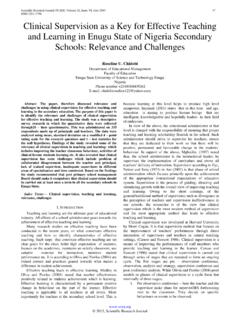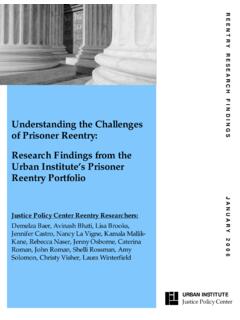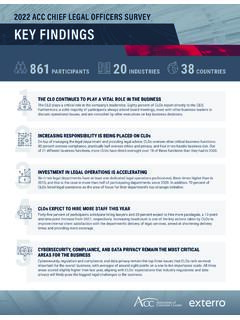Transcription of Challenges Faced by Adult Learners in Online Distance ...
1 Reception date: 1 November 2018 Acceptance date: 21 January 2019 DOI: Praxis, vol. 11 issue 1, January March 2019, pp. 5 22 (ISSN 2304-070X) Challenges Faced by Adult Learners in Online Distance Education: A Literature ReviewMehmet Kara Amasya University Fatih Erdo du & Mehmet Koko Trabzon University, Trabzon & Kursat Cagiltay Middle East Technical University Online Distance education provides Adult Learners with an opportunity for life-long learning, there are still factors challenging them to engage in educational processes. The purpose of this study is to explore the Challenges Faced by Adult Learners in Online Distance education through the analysis of the relevant literature. The articles (N=36) published in the key journals in the fields of open and Distance education, instructional technology, and Adult education were reviewed and analyzed through constant comparative analysis in the current study.
2 The findings reveal that Adult Learners have Challenges related to internal, external, and program-related factors indicating the interrelated nature of these Challenges . The findings also show that the Challenges experienced by Adult Learners vary depending on their age, gender, knowledge and skills as well as the context in which they study. The findings of this study, which has an exploratory nature, have several implications for Distance education stakeholders such as administrators, instructors, instructional designers, and policy makers. Keywords: Online Distance education, Adult Learners , challengesIntroductionIt is clearly known that Distance education provides Adult Learners with the advantage of life-long learning due to its flexibility. Distance education is defined as the planned teaching and learning activities provided through the use of a communication channel within an institutional organization without any time and place limitations (Moore & Kearsley, 2011, p.)
3 2). With the widespread adoption of the Internet and Online tools as the communication medium, Online Distance education empowered the flexibility of educational opportunities. Considering the advantages of Online Distance education, adults compose the largest audience for Online Distance education (Ke & Xie, 2009; Lim, 2001) and consequently the limits of the diversity expand in Online Distance education practices. Specifically, they display significant differences from traditional students in terms of their academic, psychological, and life characteristics (Richardson & King, 1998). Besides, their engagement in education is more irregular and varied compared with the traditional ones (McGivney, 2004). This variation and irregularity is due to the fact that they mostly continue their education with their work and family responsibilities.
4 With all these in mind, Adult Learners unique characteristics cause unique Challenges for them, which affect the way they continue their education or participate in Online Distance educational PRAXIS INTERN/ITION/ll COUNCIL FOR OPEN AND Distance EDUCATION Open Praxis, vol. 11 issue 1, January March 2019, pp. 5 22 Mehmet Kara et Learning Adult Learners have distinct characteristics in comparison to traditional students. Firstly, they are aware of why and what they need to learn (Knowles, 1996). It is also known that the Adult Learners , who have diverse educational background and goals, want to reflect their experiences on their educational process (Lindeman, 2015). They are different from other Learners in terms of their responsibilities in their daily lives, which influence their educational experience (Cercone, 2008).
5 For this reason, there is a need for an educational environment where Adult Learners are allowed to determine their own educational processes; to share their ideas comfortably; and to sustain their educational process alongside their private lives. Thus, Online Distance education environment offers appropriate opportunities through the flexibility it provides for Adult Learners , who are aware of their own learning responsibilities and are required to manage their own learning spite of the increase in the number of Adult Learners and consequently in the diversity of the students in Online Distance education, the number of the studies related to them are fewer in the literature than those studies about traditional Learners (Chu & Tsai, 2009; Ke, 2010; Remedios & Richardson, 2013). Adult Learners can be classified as young and older adults depending on their ages.
6 However, Adult learner can be defined as the ones who continue their education by balancing their family and work and are generally older than 22 (Kahu, Stephens, Leach & Zepke, 2013) and these characteristics makes them quite different from traditional Learners . Although these differences might provide Adult Learners with some advantages in educational processes, they might lead to various Challenges as well. As a consequence, these point out the need to plan educational environments and processes in accordance with these Learners Learners in Online Distance EducationConsidering the learner-centered nature of all instructional design models, it is a necessity to design and implement Online Distance education programs that meet the needs of diverse Learners including adults. This requires a sound understanding of the link between Adult Learners characteristics and the appropriateness of the Online environments for their Online can manage learning processes wherever and whenever they desire through the Online learning environments.
7 Additionally, Adult Learners have an opportunity to engage in more interaction via the tools ( discussion and chat) offered by Online learning environments (Kim, Liu & Bonk, 2005). By this way, they can develop virtual teaming skills and control their own learning processes (Kim, Liu, & Bonk, 2005). Interaction is also considered as a key factor in Online Distance education and it is a good predictor of learning (Picciano, 2002). Online Distance education also provides an opportunity for Learners to engage in individualized instruction and thus learning processes can be planned in harmony with their characteristics (Means, Toyama, Murphy, Bakia & Jones, 2009). Furthermore, one of the most fundamental and crucial benefits of Online Distance education for adults is the opportunity for life-long learning.
8 In addition to the advantages of Distance learning mentioned above, it is known that especially Adult Learners face particular Challenges during their Online education. Computer and Internet self-efficacy of Adult Learners play a significant role in Online learning processes (Johnson, Morwane, Dada, Pretorius & Lotriet, 2018). The Learners who have low perception of competency in these issues or the older Adult Learners might have Challenges in this process and this might cause learner dropout (Appana, 2008). The problems related to learner support might also be experienced in Open Praxis, vol. 11 issue 1, January March 2019, pp. 5 22 Challenges Faced by Adult Learners in Online Distance Education: A Literature Review7online Distance education. It might be the case that Adult Learners do not have available support through the related resources and orientation programs as college students do.
9 Therefore, they might feel isolated in their educational experience. The Challenges they experienced in education might increase when they lack of adequate support from their families and workplaces. In addition, adults have multiple roles such as spouse, parent, colleague, and student, each of which means additional responsibilities and workload (Thompson & Porto, 2014). These Challenges might affect their learning success as well as causing dropout in Online Distance education programs or courses (Park & Choi, 2009). Increasing dropout rates are considered as a crucial problem in Distance Adult education. One study by Choi and Kim (2018) examined meaningful factors affecting Adult Distance Learners decisions to drop out. Their study found that some of the factors affected Adult Learners decisions to persist in or drop out of the Online degree programs such as basic physical constraints from work, scholastic aptitude, family/personal issues, motivation for studying, academic integration, interaction, and motivation (Choi & Kim, 2018).
10 In another major study, Lee, Choi and Kim (2013) found that academic locus of control and metacognitive self-regulation skills were the more important factors influencing the dropout of Adult Learners . Deschacht and Goeman (2015) emphasized that future studies should be focused on preventing the dropout of Adult Online Learners . These studies showed that the external and internal Challenges Faced by adults increased the likelihood of Adult Learners dropout. Due to the high rates of dropout, particularly by Adult Learners as a result of the Challenges they Faced , student retention is now considered as a success factor in Online Distance education programs (De Paepe, Zhu & DePryck, 2018; Martinez, 2003). Thus, there is also an immense need to focus on these Challenges in Online Distance education research has concentrated on what to do to improve quality and Adult Learners performance in Online Distance education (Johnson et al.)
















